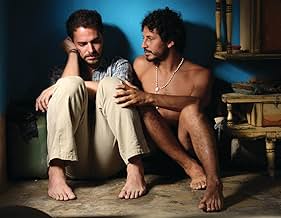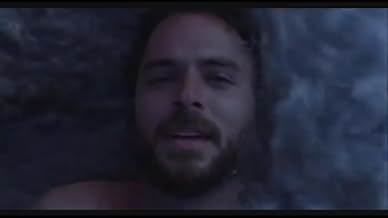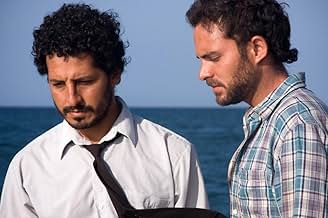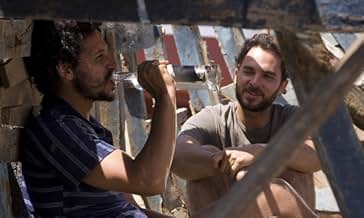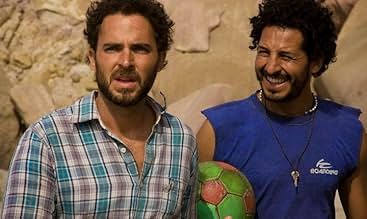IMDb-BEWERTUNG
7,7/10
7377
IHRE BEWERTUNG
Füge eine Handlung in deiner Sprache hinzuAn unusual ghost story set on the Peruvian seaside; a married fisherman struggles to reconcile his devotion to his male lover within his town's rigid traditions.An unusual ghost story set on the Peruvian seaside; a married fisherman struggles to reconcile his devotion to his male lover within his town's rigid traditions.An unusual ghost story set on the Peruvian seaside; a married fisherman struggles to reconcile his devotion to his male lover within his town's rigid traditions.
- Regie
- Drehbuch
- Hauptbesetzung
- Auszeichnungen
- 13 Gewinne & 13 Nominierungen insgesamt
Humberto Cavero
- Padre Juan
- (as Julio Humberto Cavero)
Liliana Alegría
- Carlota
- (as Liliana Alegria Saavedra)
Tomas Fernandez
- Sabino
- (as Tomás Fernández)
Empfohlene Bewertungen
I know a movie is excellent when the day after seeing it I still have a pit in my stomach as I did after watching this one. I know there are going to be some great reviews written about this so I'm only going to add to the momentum briefly without trying to find ways to get you to watch this one.
I felt bad for nearly every character in this movie...not just for those directly experiencing the effects of forbidden love but also for society observing it. Here, a seaside village in Peru questions its own moral code when a well-liked member of the community must decide whether to place his love for another man before social acceptance. Superb acting, character evolution, simple but engaging plot, and exhausting emotion all converge in this touching story.
I felt bad for nearly every character in this movie...not just for those directly experiencing the effects of forbidden love but also for society observing it. Here, a seaside village in Peru questions its own moral code when a well-liked member of the community must decide whether to place his love for another man before social acceptance. Superb acting, character evolution, simple but engaging plot, and exhausting emotion all converge in this touching story.
This movie gathers impetus as it goes along, so that by the end you are completely caught up in its complex and very moving depiction of the twists and turns of the human heart. The story exists on several levels--love story; political/religious commentary; ghost story. Filmed in a seaside village in Peru, the movie has beautiful cinematography, and the music soundtrack is also evocative of a culture far removed from city life. The three principal actors are superb, especially Cristian Mercado as the tormented husband/lover. The supporting players are also outstanding, each contributing to the overall depiction of the townspeople observing the drama that unfolds. I won't give the plot away except to say that it exists on more than one level of reality. Highly recommended.
In early 2010, the first Peruvian film ever nominated for a Foreign Language Film Oscar -- "Milk Of Sorrow" (2009) -- got a U.S. 2-screen release that grossed all of 10K. Clearly UNDERTOW has no Peruvian coattails to ride in on. Despite Sundance kudos and buzz, it's already being ghettoized as a gay film. Yet it clearly is so much more. UNDERTOW doubly violates that genre's political correctness: the lead is both closeted and heroic while the captivating tale constantly eschews white/urbane predictability. We watch two more curve balls being thrown at us as well: next-world fantasy and 3rd world folklore. So this is definitely not "'Brokeback Mountain' meets 'Ghost'" as several critics have written it off in facile reviewer shorthand. But UNDERTOW may well have the power to connect with portions of the mainstream audiences for both of those films -- via word of mouth, curiosity-building press and guerrilla marketing. Our unexpected attraction to a real-life subsistence-poor fishing village and its close-knit, tradition-bound "primitive" citizens are seamlessly woven into the film's cast as well as fabric. Breath-taking cinematography, a script illuminating characters rather than telescoping plot, understated yet powerful performances and a hypnotic world music soundtrack take UNDERTOW far beyond the shorelines of dry-docked movie-making. Many high-concept films have dealt with men forced to choose between family and lovers. Others have pitted unlikely heroes against the mores of society. Nor is a quest to carry out the final wishes of the dearly departed at all innovative. But UNDERTOW combines these themes in a way no writer- director has done before. First-timer Javier Fuentes-León does so with fearless honesty and sublime-on-a-shoestring craft. No surprise then that it's this year's Foreign Language entry from Peru.
One of the best new films exploring gay male identity, love and relationships, and likely will be a worthy addition to many personal "favorite gay films" lists, although the fact that the film is set in a town, and to some extent a culture, where, at least for a large part of the story, many in the town have not yet evolved in their views of LGBT people and issues, created some (ultimate unnecessary) anxiety for me early in the film, and at parts throughout, as to whether the film would be a throwback to older, more stereotyped and limited representations and stories of gay life, although those anxieties were not only relieved by the end of the film, but, as I suggested, the film is an extremely valuable addition to the new wave of gay cinema.
The writer, director, casting director and cast, cinematographer, set designer and other members of the film-making team also do a great job exploring rural, small town life, with its traditions (religious and otherwise...) superstitions, and class differences, and the interplay among the individuals, families and community who inhabit the town, along with the welcome (or rejection...) given to a stranger who comes there, and who many perceive as a threat to the social fabric of the town, and the support (or lack of it...) the townspeople and characters show to each other, ultimately examining the struggle between bigotry and ignorance, on the one hand, and the struggle to overcome that bigotry and ignorance, and replace it with support, respect and love on the other. Most of the townspeople are not financially well-off, but make just enough to get by, working in occupations connected to fishing and the sea, and the way they relate, individually and as a community, to each other (and to themselves, in regard to what is the true definition of a man, of an individual's self-respect) in light of a newcomer who is more financially well-off, and his artistic and suspected sexual/relationship interests, are additional themes of the film, which play out so well in a beautiful, interesting and captivating way, often evoking strong emotions, and at times offering an inspiring catharsis (and perhaps a few tears, in reaction to some sadness, and much beauty.)
And there are many other highlights of the film beyond all that, including the amazingly beautiful setting, in a rural, seaside Peruvian village, the cinematography, musical score, performances, plot twists and turns, the mix of fantasy and reality (and moments where it's unclear to what extent fantasy exists as an aspect of the story's reality.) This is a truly unique and creative film, and one of the most rewarding experiences I've had at a feature film in a long time.
The writer, director, casting director and cast, cinematographer, set designer and other members of the film-making team also do a great job exploring rural, small town life, with its traditions (religious and otherwise...) superstitions, and class differences, and the interplay among the individuals, families and community who inhabit the town, along with the welcome (or rejection...) given to a stranger who comes there, and who many perceive as a threat to the social fabric of the town, and the support (or lack of it...) the townspeople and characters show to each other, ultimately examining the struggle between bigotry and ignorance, on the one hand, and the struggle to overcome that bigotry and ignorance, and replace it with support, respect and love on the other. Most of the townspeople are not financially well-off, but make just enough to get by, working in occupations connected to fishing and the sea, and the way they relate, individually and as a community, to each other (and to themselves, in regard to what is the true definition of a man, of an individual's self-respect) in light of a newcomer who is more financially well-off, and his artistic and suspected sexual/relationship interests, are additional themes of the film, which play out so well in a beautiful, interesting and captivating way, often evoking strong emotions, and at times offering an inspiring catharsis (and perhaps a few tears, in reaction to some sadness, and much beauty.)
And there are many other highlights of the film beyond all that, including the amazingly beautiful setting, in a rural, seaside Peruvian village, the cinematography, musical score, performances, plot twists and turns, the mix of fantasy and reality (and moments where it's unclear to what extent fantasy exists as an aspect of the story's reality.) This is a truly unique and creative film, and one of the most rewarding experiences I've had at a feature film in a long time.
This film was the "buzz film" at Frameline, the San Francisco LGBT film festival. It is now in very limited commercial release. I saw it for the second time this week and it's as powerful on the second viewing as the first. It's beautifully filmed in a stunningly picturesque Peruvian fishing village. It features tender and complex performances by the actors in the lead roles, and wonderful authentic performances by native residents of the village location. The story delivers a powerful study in internal conflict, grief, redemption, and the power of love. The director says that the idea for the story came from a screen writing-class assignment to write a scene that happens in a kitchen. The kitchen scene is indeed pivotal to the story, but the moral intricacy of the tale surrounding that scene is testament to a creative genius that you will want to hear more from. You will want to see this film again, and you will want your friends to see it, because the world needs more filmmakers like this.
Wusstest du schon
- WissenswertesAlthough both main characters are Peruvian, the actors who play them are not. Cristian Mercado (the Fisherman) is Bolivian and Manolo Cardona (the Photographer) is Colombian.
- VerbindungenFeatures Direito de Amar (1987)
Top-Auswahl
Melde dich zum Bewerten an und greife auf die Watchlist für personalisierte Empfehlungen zu.
- How long is Undertow?Powered by Alexa
Details
- Erscheinungsdatum
- Herkunftsländer
- Offizielle Standorte
- Sprache
- Auch bekannt als
- Contracorriente - Gegen den Strom
- Drehorte
- Produktionsfirmen
- Weitere beteiligte Unternehmen bei IMDbPro anzeigen
Box Office
- Bruttoertrag in den USA und Kanada
- 108.620 $
- Eröffnungswochenende in den USA und in Kanada
- 6.749 $
- 19. Sept. 2010
- Weltweiter Bruttoertrag
- 602.059 $
Zu dieser Seite beitragen
Bearbeitung vorschlagen oder fehlenden Inhalt hinzufügen


